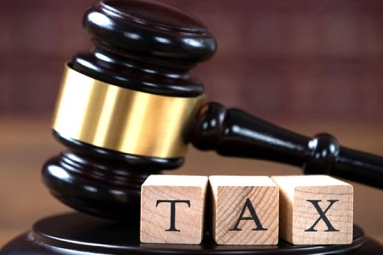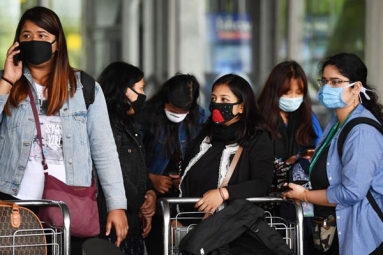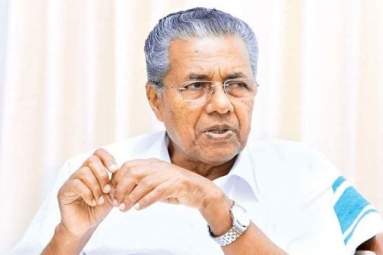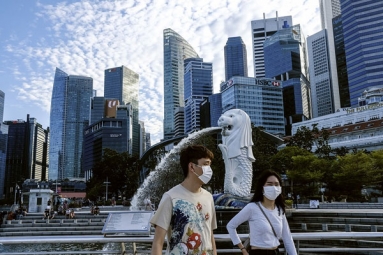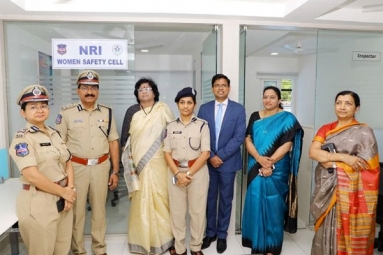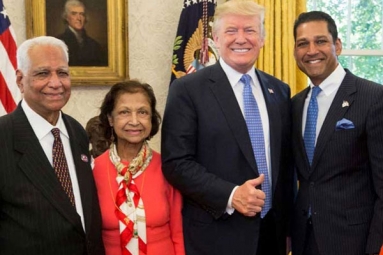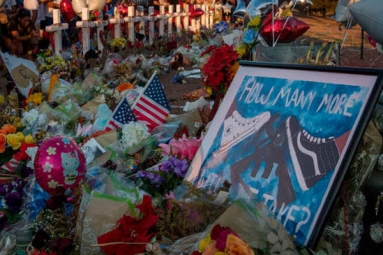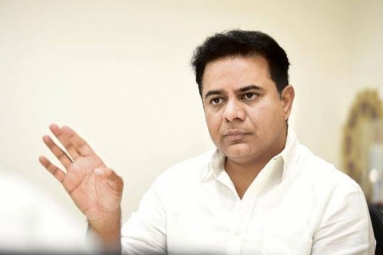Relief For NRIs Who Stuck In India- They Won't Lose NRI Status and Don't Need To File Returns May 11, 2020 09:44
Finance Minister Nirmala Sitharaman declared that NRIs don't need to file returns. It was ordered by the income tax department to make it an exception for the NRIs who are stuck in India due to lockdown. Indians who are residing abroad are not considered as a resident for tax purposes by the income tax department if they spend less than 120 days. The point to be noted is, many NRIs exceeded the limit of 120 days stay in India as per COVID-19 condition and they may have to extend for a few more days. An official from the financial ministry said that the Finance Minister received many people who are concerned about their stay in India as they need to file returns as Indian citizens. So, the minister addressed the issue of such people and extended their stay to determine their residence status. The Finance Minister confirmed that the Central Board of Direct Taxes would extend the stay of NRIs without any tax returns in India as it is unsure about when the international flight will start. This exception is applicable for the financial year 2020-21. This exception is for both the categories of NRIs who are staying back in the country from an evacuation flight or were already in the country. - Ramya
Read MoreIndia Permits The Foreign Citizens To Travel Back their Country- For OCI and green Card Holders May 07, 2020 09:31
The Government of India passed and started allowing the foreign citizens to travel to their country. The travellers must be holding the OCI or and Green Card. Under the condition of travelers holding a visa of at least one-year duration of that foreign country and in case of medical emergency or death in the family of those Indian nationals holding six-month visas are also permitted to travel- declared by Standard Operating Protocol (SOP) issued by the Ministry of Home Affairs (MHA)They need to complete the formalities by applying to the Ministry of Civil Aviation (MoCA). The application includes the purpose and the particular details. It is mandatory to mention the departure and arrival destinations. Before the ticket book for the travelling, it includes the process where the destination country allows the person’s entry. This is clarified by SOP to MoCA as it is responsible to confirm the entry in the home country.The condition must be fulfilled by the citizens to start and land in the destination country. Confirmed by SOP stating “The conditions, if any, imposed by the destination country, will have to be fulfilled by the persons intending to travel,” the SOP reads.” Along with this confirmation it stated “The travel from India shall be on the non-scheduled commercial flights that are being arranged by MoCA for bringing back stranded Indian nationals from abroad and the cost of travel, as specified by MoCA, will be borne by such travellers.”Before boarding the flight from India, the travelers must undergo the thermal screening as per the health protocol and the health check process is handled by MoCA. The thermal screening results COVID-19 negative, only then the person is allowed to board the flight. While traveling, everyone needs to follow the health protocol that includes wearing the mask, sanitizing hands, and environmental hygiene. Staff, crew and passengers, everyone must strictly follow this health protocol while the flight is on board.By Ramya C
Read MoreIndian-American psychiatrist fined over opiod violations May 01, 2020 12:27
An Indian-American psychiatrist was recently fines with $145,000 for prescribing excess dosage of opiod medication, as per the reports from the Justice department. The accused, Prakash Bhatia, who practised pain control medication San Diego area in California was ready to pay the fine following the threat from the Drug Enforcement Agency to begin an investigation into whether or not he prescribed opiods to his patients in an improper way in violation of the Controlled Substances Act. Robert Brewer, the federal prosecutor for Southern California further stated saying, “Overprescribing opioids to patients who need treatment for their pain has contributed to the opioid epidemic in this country.” The US has been facing an epidemic with the drug abuse from the illegal use of the medications that should only be prescribed with a doctor’s prescription and not otherwise. As per the released government statistics, over 15,000 people have died because of drug overdose in 2018. The prosecutors have reported that Bhatia prescribed medications like hydromorphone, morphine, methadone, oxycodone, fentanyl and oxymorphone to his patients without any legitimate need of the same. He had also prescribed those said medicines along with anti-depressants including benzodiazepines and muscle relaxants which further deteriorate the abuse and cause even worse implications of the condition. By Somapika Dutta
Read MoreOver 1 Lakh NRI Keralites register to return home April 28, 2020 08:43
Following the announcement made by the Kerala government about opening the online registration for the Non-Resident Keralites who are stranded in foreign countries, over 1 lakh registrations have been submitted so far. The same happened just after 12 hours of the registration being open. Majority of the registrations have poured in from countries and nations around the Middle East countries. Maximum of the registrations are from UAE. The registration was being conducted on www.norkaroots.org which is the official body of the diaspora in the state. This new facility was finally opened by the State followed the flood of messages that they received from the NRIs stranded all across the globe. The Union Cabinet Secretary has also asked on the ways that the state governments are going to work to make arrangements for the returning diaspora, especially if they are coming from some of the most infected parts of the world. The efforts and strategies suggested and imposed by the Kerala Chief Minister Pinarayi Vijayan were highly praised by the Union Minister cabinet and they have also suggested the other states to follow through with the same process. Vijayan reported that all the necessary arrangements were sorted out in all four airports in Kerala. The people who are going to arrive are going to be screened. While the ones with no signs of Covid-19 will be allowed to return to their homes and isolate there, the other will be quarantined in the facilities that the government has arranged and with all the necessary precautions. According to the reports from the state government, several of the hostels, hotesl, and even private hospitals will host the accommodation facility. Some of the floating houseboats at Alappuzha will also act as quarantine facilities. Some of these quarantine centres are going to function for free. But, in case some wants better facilities and comfort, they will be levied with charges for that. Out of the 2.5 million non-resident Keralites in the world, 90% of them are based out of the Middle East Countries. Around 3-5 lakh people are likely going to return following the resuming of the air services in the country. By Somapika Dutta
Read MoreKerala initiates online registrations for NRIs wanting to return to India April 27, 2020 07:50
Even before the resumption of the flight services that have been halted in the country due to the ongoing coronavirus crisis, Kerala has started their online registrations for all the NRIs of the state who want to return from abroad.The Kerala Chief Minister, Pinarayi Vijayan held video conferencing sessions with some Non-Resident Keralites yesterday regarding the steps that the government is taking to bring back some of the people who have appealed to return to the country.The CM then announced that the Department of Non-Resident Keralites Affairs (NORKA) has opened up the online registration process for the individuals who want to return home due to the rising crisis surrounding the Covid-19 pandemic.Those stranded in other countries are going to be brought back to safety to India after the Centre resumes the flight services and gives this a green signal."Those returning should undergo screening at airports. All those returning should undergo mandatory home quarantine for 14 days. Arrangements of isolation wards will be provided for those unable to go home," CM Pinarayi Vijayan exclaimed.The Kerala government has been working extensively to bring back the expatriats with a lot of elaborate arrangements. All of these individuals will have to follow a minimum of 14 days of self-quarantine after they land in India.CM Vijayan has also written an appeal to PM Narendra Modi about arranging some flights to bring back the NRIs who are stranded abroad, especially around the Gulf nations.The state government has also clearly mentioned that the online registration process is to get a ballpark figure for the isolation facility that needs to be created, if there is a need for one. The same is not going to impact any priorities on flight bookings. Once every NRK fills out the registration form, the Kerala government is going to draw up the list and try and get as many people back to the country once the lockdown is removed and things get back to normal. Kerala currently has around 120 active cases and had a total of 458 confirmed cases and 2 deaths.By Somapika Dutta
Read MoreMiss England gets back to her duty as NHS doctor during pandemic April 08, 2020 06:00
Beauty with brains is a term that is often misused, especially for women. Crowned as Miss England in 2019, Bhasha Mukherjee kept aside her beauty crown and returned to the United Kingdom from her charity work to continue her career as the NHS doctor to help patients during the coronavirus pandemic. Mukherjee took a break from her career after winning the Miss World pageant wherein she represented England. Owing to her intellect, she was asked to be part of a number of charities across the world, which is where she was planning to be in until August of this year. In an interview with CNN, she stated saying, “I was invited to Africa, to Turkey, then to India, Pakistan and several other Asian countries to be an ambassador for various charity work.” She started her tour with India on March 04 and was there for four weeks on behalf of Coventry Mercia Lions Club, which she was an ambassador for. The charity mainly focused on development and community charity. They worked with orphaned kids and abandoned girls to provide them with a home and education. But, with the coronavirus pandemic hitting UK pretty bad, Mukherjee was consistently getting calls from her former colleagues to come back as the hospitals were in need of more doctors. She got calls from her old hospital, the Pilgrim Hospital that is located in Boston, eastern England. Responding to the crisis, Mukherjee contacted the management of her old hospital to let them know that she wanted to come back home during this time and take on her responsibilities. She said to CNN that it doesn’t feel right to wear a crown when she can’t even do any good that she was touring the world for. Mukherjee said that after hearing everything that was happening back at home, all that she wanted to do was come back home and get straight to work. Mukherjee has been a resident of the United Kingdom after moving from Kolkata, India at the age of 9. She further stated saying, “I felt a sense of this is what I'd got this degree for and what better time to be part of this particular sector than now." She was elated to see how the world was celebrating the key workers and appreciating their efforts and knowing that she could add more value to it because of her degree and skills, she wanted to come back and do that. Mukherjee was in contact with the British High Commissioner in Kolkata and talked to them to arrange a flight back home. She returned on Wednesday in a flight from India to Frankfurt and then to London. She believes that there is no better time to stand up to her crown of Miss England and save people’s lives now. Mukherjee is currently self isolating for the coming one or two weeks as protocol following which she will be able to return to work. UK has already reported over 55,000 confirmed cases with over 6000 deaths. By Somapika Dutta
Read MoreThree Indians among 42 confirmed Covid-19 cases in Singapore March 30, 2020 13:50
Among the 42 new cases reported in Singapore, three Indian nationals have been identified in them. This has taken up the total number of confirmed cases in the country to 844. Out of the 42 new cases, 24 of them are imported and have international travel history from some of the hotspots across the globe. The three Indians who have been identified as positive for the coronavirus infection include a 35 year old female, 34 year male with a work pass of Singapore and a 43 year male who is a permanent resident of Singapore. One of the latest cases in the country also includes a 42-year old permanent resident who is a nurse in the local hospital. She contracted the virus possibly at her workplace as there are no reports of international travel. She started showcasing the symptoms of the disease on March 24, 2020 and finally got the confirmed test results on March 27, 2020. According to reports from a local news channel, she is kept in isolation in the hospital that she works in. Of all the 423 cases in the hospitals in Singapore, 19 are currently in critical condition. The others are either stable or improving from the state that they were admitted in. 14 patients have recently already recovered from the condition and have been discharged from the hospitals in Singapore. In total, 212 of the infected patients in Singapore have already recovered from the virus. By Somapika Dutta
Read MoreVivekananda Yoga University in the US to now Start PG Courses February 17, 2020 05:58
The Vivekananda Yoga University (VAYU) which is said to be the world’s first yoga university that is situated outside India which is in the United States. The officials of the university say that, along with the research in the ancient Indian practice the Vivekananda Yoga University (VAYU) is also said to start its post graduation course later during this year.The admissions for the courses in the university would be starting in the month of April, as said by the officials of the university on Saturday.The initial campus of the world’s first yoga university outside India has been established with a budget of around USD 5 million in Los Angeles.The university has stated that Sree Sreenath who is a professor from Case Western University has been named as the President of the Vivekananda Yoga University where as H R Nagendra who is the Indian yoga guru has been named as its chaiman.The university has also stated that the admissions for the post graduation course would get started in the month of April in this year and the programmes would get started from the month of August, 2020 which would be under the leadership of Sree Sreenath as the founding President.The official recognition has been received from the Bureau for Private Post secondary Education, California in order to offer a yoga- based higher education programmes in the month of November during the previous year following which the announcement has been made by the university.Collaborative research, credit transfers and joint programmes with several premier universities around the world would be facilitated by the Vivekananda Yoga University.This university is said to be aiming to provide man- making and nation- building education as it promotes the all- round personality development in the students. Nagendra who is the chairman of the Vivekananda Yoga University is a former scientist from NASA who has said to be working in the conversion of yoga into a socially relevant science for almost four decades now.It has been said that thousands of individuals who teach yoga with the limitation of around 200 to 500 hours of the certificate program would get benefited by the courses that are being provided in the Vivekananda Yoga University as it yoga teachers who have been limited regarding the yoga education programmes would now be progressing further into a university- based higher education, as said by Prem Bhandari who is a member in the board of directors of the Vivekananda Yoga University.By Shrithika Kushangi
Read MoreNRI Women Safety Cell in Telangana logs 70 petitions February 14, 2020 12:36
An NRI Cell of Women Safety Wing (WSW) has been inaugurated in the month of July in the last year and it has been recorded 70 complaints until now. Out of the 70 complaint that have been registered 29 cases are said to be under investigation where as 41 cases are at trial stage.Look out circulars have been executed against the NRI spouses in around five cases where as in six passports of NRI accused were impounded.A workshop for two days has been inaugurated at the NRI cell, on Thursday. The workshop has been inaugurated aiming at the capacity building in order to bring convergence among the investigating officers, public prosecutors and the victims. A voice over app has been launched by the TS IT Cell. It has also launched an information brochure on Services of TS NRI Cell.Swati Lakra who is the inspector general of police of the Women Safety Wing has said that standard operating procedures have to be followed during the investigation of the cases of the Non- resident Indians.The NRI Woman Safety cell has been inaugurated by M Mahendar Reddy who is the Telangana Director General of Police, in Telangana Women Safety Wing in Lakdikapool in Hyderabad.The NRI women safety cell has been inaugurated in order to provide the legal guidance by the support of NILA which is an NGO for the women who have been aggrieved in the NRI marriages.Swati Lakra has also said that the NRI women safety cell would guide the SHOs in the course of the investigation of the cases that are related to harassment of the NRIO spouses or the relatives. The SHOs will be provided with the training in investigation and various procedures and also legal guidance will be provided to victims for the further approaches and the contacts, liason with agencies like embassies, Ministry of external affairs, National Women Commission, NGO when they would be required.By Shrithika Kushangi
Read MoreIndian-American Appointed to Trump’s Advisory Commission February 04, 2020 13:41
An Indian- American Prem Parameswaran has been appointed by the President of the United States Donald Trump as a member of the Advisory Commission on Asian Americans and Pacific Islanders.The appointment has been done prior to the US President Donald Trump paying a visit to India which has scheduled to be between the 24th- 26th of February.Parameswaran is said to be the only Indian who has been selected in the commission that comprised of thirteen members. Prem Parameswaran is currently the president of Indian motion picture production and distribution company Eros International’s North America operations.The resignations has been submitted by ten members of the Asian Americans and Pacific Islanders who are known as the AAPIs in the year 2017. The move had been taken as they had stated their objection to the portrayal that has been made by Donald Trump as he had portrayed the immigrants, refugees, people of color and people of various faiths as untrustworthy, threatening and a drain on the nation.Parameswaran has said in a statement that being an Indian- American from New York and the son of Indian immigrants who had come to the country as students, he feels overwhelmed and honoured by being appointed as the member of the Advisory Commission on Asian Americans and Pacific Islanders.He added saying that he looks forward in working with co- chairman Elaine Chao, secretary of transportation, as well as the fellow members of the President’s Advisory Commission in order to improve the health, education and economic status of AAPI.Paremeswaran has earlier worked with the Jefferies Group and was the head of media and telecom for the Americans.He was born, brought up and based in New York and has joined Eros International in the year 2015 and has been experienced in various fields which include global telecommunications, media and investment banking.Prem Prameswaran has been graduated from the Columbia University and has also received an MBA from the Columbia Business School.By Shrithika Kushangi
Read MoreUS Killings in 2019, Highest than any other Year from 1970s December 30, 2019 06:36
The Associated Press, USA Today and Northeastern University compiled a database which shows that, there were more killings in 2019 than any other year from the 1970s.The first one was where a man killed four family members which includes his infant daughter with an axe and this occurred just 19 days after entering into the new year. Five months later, 12 people were killed in a shooting which took place in a workplace in Virginia. The incident at a Walmart in El Paso witnessed twenty two people being dead in August.It was found that, more than 41 mass killings took place where in four or more people are killed with perpetrator being excluded. Of the 41 mass killings, 33 were mass shootings and more than 210 people were killed.In the majority of the killings, the incidents took place involving the people knew each other as in family disputes, drug or gang violence or as anger being showed at co-worker or relatives.The very first incident that took place in Oregon was one of the 18 mass killing which involved family members and one of the six that had no involvement of a gun. According to the AP/USA Today and Northeastern database, the second most killings prior to 2019 was 38 in 2006.James Densley, a criminologist and professor at Metropolitan State University in Minnesota said that, "What makes this even more exceptional is that mass killings are going up at a time when general homicides, overall homicides, are going down.” he added saying that, “as a percentage of homicides, these mass killings are also accounting for more deaths.”He believes that the mass shootings can be a by product of an “angry and frustrated time” and he mentioned that crime tends to go in waves with number of serial killers in the years 1970s and 1980s, school shootings in 1990s and child abductions and concerns of terrorism dominated the early 2000s.By Shrithika Kushangi
Read MoreExecutive Committee for TRS NRI Canada Unit Announced December 30, 2019 05:07
Mahesh Bigala, coordinator of TRS NRI wing announced the full-fledged executive committee for the Canada unit of TRS NRI on Sunday after consulting K Kavitha, honorary advisor and former MP. Krishna Kumar Komandla has been appointed as the president of TRS NRI wing of Canada and the general secretary will be Sairama Krishna.The other executive committee members include Prabhakar T as the vice-President, Chetan K as joint secretary, Satish V as treasurer and the other members Lalith A, Sumanth G, Saicharan G, Uday A, Ramachandra T, Madhusudhan P, Vineesh M, Sandeep M, Lokesh R and the advisors as Karunakar P and Srinath K.All the newly appointed members took a vow in working for the victory of TRS in the result of municipal polls through the social media campaign and they thanked K Chnadrashekar Rao, TRS president and Chief Minister, the working president KT Rama Rao and the wing advisor of TRS NRI K Kavitha for providing them an opportunity to serve people of the state of Telangana.By Shrithika Kushangi
Read More
